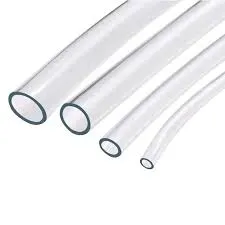Nov . 23, 2024 12:36 Back to list
cpvc tube
Understanding CPVC Pipes Features and Applications
Chlorinated Polyvinyl Chloride (CPVC) pipes have garnered significant attention in the plumbing and construction industries due to their excellent durability and versatility. CPVC is a thermoplastic material derived from PVC, with additional chlorination that enhances its properties. This article aims to explore the features and applications of CPVC tubes, emphasizing their benefits in various settings.
Properties of CPVC Tubes
One of the primary advantages of CPVC pipes is their exceptional resistance to heat and chemicals. CPVC can withstand temperatures up to 200°F (93°C), making it suitable for hot water applications. This characteristic makes CPVC an ideal choice for residential and commercial plumbing systems, where hot water delivery is essential.
Furthermore, CPVC is resistant to a variety of chemicals, including acids, bases, and salts, which positions it as a reliable option for industrial applications. With a low coefficient of friction, CPVC pipes allow smooth water flow, reducing the risk of clogs and ensuring longevity.
Another noteworthy property is the material’s corrosion resistance. Unlike metal pipes, which may corrode over time due to exposure to water and air, CPVC is not susceptible to rust or corrosion. This attribute results in a longer lifespan for the piping system, reducing maintenance costs and the frequency of replacements.
Installation Benefits
Installing CPVC pipes is relatively straightforward, as they are lightweight and easy to handle. The installation process generally involves solvent welding, which creates strong, watertight joints without the need for additional fittings. This ease of installation makes CPVC an appealing option for contractors and DIY enthusiasts alike.
cpvc tube

Moreover, CPVC pipes are available in various diameters and lengths, allowing for flexibility in designs. Whether you’re working on a small-scale residential project or a large-scale industrial application, there is likely a CPVC pipe size that meets your needs.
Applications of CPVC
CPVC pipes are widely used in various applications, making them indispensable in modern infrastructure. In residential plumbing systems, they are often employed for hot and cold water supply lines. Their ability to handle high temperatures makes them favorable for water heaters and other applications where hot water is frequently used.
In addition, CPVC is utilized in commercial and industrial settings. It’s commonly found in the chemical processing sector, where resistance to aggressive chemicals is paramount. CPVC pipes are also used in fire sprinkler systems due to their high-temperature tolerance and reliable performance.
Furthermore, CPVC is becoming increasingly popular in the construction of HVAC systems. Its capacity to handle various refrigerants and resist temperature fluctuations makes it suitable for air conditioning and ventilation applications.
Conclusion
In conclusion, CPVC pipes offer a compelling combination of durability, chemical resistance, and ease of installation. Their ability to perform well in high temperatures and harsh conditions makes them ideal for a wide range of applications, from residential plumbing to industrial chemical transport. As the construction and plumbing industries continue to evolve, CPVC tubes are likely to play an increasingly vital role in ensuring efficient and reliable systems. Whether you are in the building trades or simply looking to understand modern plumbing solutions, familiarity with CPVC pipes is essential.
-
Premium CPVC Sheet: High-Temp & Chemical Resistant Solutions
NewsAug.15,2025
-
Durable PPR Pipe for Hot & Cold Water Systems - Easy Install
NewsAug.14,2025
-
Durable HDPE Sheet | Versatile & Impact-Resistant Plastic
NewsAug.13,2025
-
Premium PVC Soft Sheets: Clear, Flexible & Durable
NewsAug.12,2025
-
Premium PVC Round Rods: Durable, Chemical Resistant, Easy to Machine
NewsAug.11,2025
-
PP U-channel: Chemical-Resistant, Lightweight & Durable
NewsAug.10,2025

